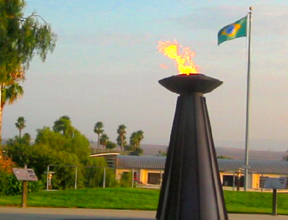Olympic Training Center torch flickers in the political wind
 The Olympic Training Center had potential, it almost was a destination place, and it almost put Chula Vista on the map. But after twenty years the question is—can the city afford to take over a facility that has had potential, had consultants, had change of leadership, had events and still ended up operating in the red?
The Olympic Training Center had potential, it almost was a destination place, and it almost put Chula Vista on the map. But after twenty years the question is—can the city afford to take over a facility that has had potential, had consultants, had change of leadership, had events and still ended up operating in the red?
In 2014 the United States Olympic Committee sent the city a letter saying that “the training center might better achieve its potential if a third party took over.” In August 2014, former council member Rudy Ramirez and council member Patricia Aguilar held a community meeting at the Olympic Training Center to discuss the future of the site.
At that meeting Ramirez and Aguilar listened to concerns of residents who worried how change will impact the already aggravated traffic and parking issues in the Otay Lakes area. Many attendees also expressed to the council members their hope to see the Olympic Training Center continue to operate—whatever it takes.
Ramirez and Aguilar informed the residents that the Training Center had been operating in the red and in any scenario the city could not afford to subsidize the center. The council members also said that the city of Chula Vista and the U. S. Olympic Committee would be sharing the cost for a feasibility study prepared by JMI Sports. Many of the principals that founded JMI Sports, a management and consulting firm, are the ones that brought Petco Park to the area.
In August of 2015, 10News reported “The South Bay city [Chula Vista] has reached a preliminary agreement with the US Olympic Committee to transfer ownership of the Olympic Training Facility from the USOC to Chula Vista.”
The 10News report went on to say, “The city has issued a Request for Expression of Interest to find someone to operate the 155-acre training center. They need to find that operator before the deal can be finalized.”
Curiously, the Request for an operator interested in acting as a third part preceded the JMI Sports study that the city and the USOC had jointly commissioned. The study is supposed to examine the financial feasibility of several options and include public input, so some have wondered how the city can request an operator when it’s not clear what residents and council members want the operator to do. A public record request for the study came up empty as the study is still in draft form.
Chula Vista’s Deputy City Manager Kelley Bacon was queried by La Prensa about the Request going out before the study was completed or presented to council members. Her response: “The Council has received briefings all along and will see the agreement before it is executed by both our Council and USOC Board.
“Additionally, there will be two upcoming meetings to brief the community and take questions. The first is on Thursday, September 24 from 5:30-7:30 in Council Chambers and the second is on Monday, September 28 from 5:30-7:30 at the CVOTC [Olympic Training] Visitor’s Center.”
The Request for Expressions of Interest were originally due to the city by August 24, but the deadline has been extended to September 18. The scope of work for the operator would be to provide services for USA Olympic and Paralympic athletes as well as generate revenue by facilitating additional events like sports training or community events.
There has been a lot of speculation about what will become of the training center if the city does not purchase it. In a June 2015 U-T article, Mark Ziegler suggests that that the land could revert to park land in 2025.
Deputy City Manager Bacon opines “The land currently is owned by USOC. If we reach an agreement then the land and most of the facilities would transfer to the City in January of 2017. Without the agreement, if the USOC walks away from the CVOTC prior to 2025, then 100 acres automatically transfers to the city.”
Council member Patricia Aguilar has suggested that the site might complement the university plan which the city is in the process of developing.
Some residents have expressed concern that ultimately the land will be used for more housing development. Deputy City Manager Bacon says No. She says “the only potential housing is additional dorms for athletes within the facility. It would never be turned into residential development. The CVOTC is an amazing regional asset. It is the City’s and the USOC’s goal that it remain an Olympic Training Center or a site that we open to more community access…”
But many Eastside residents are skeptical. They feel they have been burned by the city in the past. Speaking as a supporter of the Eastlake Action Group, Adrian Ocampo said: “We are keeping a close eye on what’s happening with the Olympic Training Center. Eastlake residents have been double taxed for promised amenities that were not received. The community lost its only master-planned commercial village and resort hotel which was replaced by high density residential units—a sore subject with homeowners.
“Under John McCann’s watch, because he’s now Chula Vista’s District 1’s representative, East Chula Vista lost another valuable commercial zone in the Otay Ranch, all the open space along the south side of Olympic Parkway. This was another change in the master plan of East Chula Vista, favoring a developer at a huge negative cost to the public.
“Many East Chula Vistans are not happy with City officials whose votes negatively impact their daily lives by creating overcrowding, increased traffic, and parking problems…People expect their City politicians to be looking out for them, not the profit-hungry developers.”





